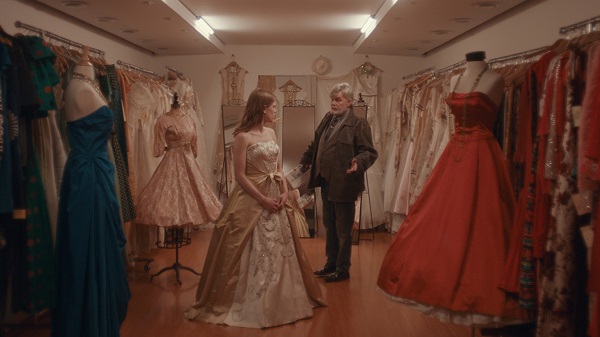
Most starving artists die young, sorry if that’s a morbid thought but it’s true. That death either comes literally or through a job, although there’s that one percent who keep being artists and stay successful doing so. Wendy Morgan’s Sugar Daddy shows that fork in the road of a musician’s life. The musician in question is Darren (Kelly McCormack), who loses another catering job, making her hundreds of dollars short on rent. That last job, though, got her in contact with another woman. And that woman recommended that she sign on to a website where she can meet a bunch of sugar daddies. Some of those daddies are weirdoes (Nicholas Campbell) or yuppies. But she also lands gold with Gordon (Colm Feore), who seems nice.
Sugar Daddy, as these movies normally do, eventually tracks what happens when she tells one person about that part time job. And of course, that person, her roommate Peter (Ishan Dave) accidentally slips that secret out to their common friends. This gives way to a conversation about sex work that is more public than Darren prefers. Her main verbal sparring partner within her friend circle is Angela (Jess Salguiero). Angela thinks that Darren is doing more than what she bargained for. And this is also my first ding against the film because the version of the conversation here feels retrograde. Morgan and McCormick’s demographic might differ from mine, but millennials have a more accepting view of sex work. A more interesting conversation would be about why most people won’t make that physical leap.
Half of the film concentrates on Darren’s encounters with with her peers. After all, she’s less guarded with the latter, she’s willing to have painful yet honest conversations with them. She’s also more likely to sleep with her peers than with her clients. This belongs to the subgenre of dramas about women in their twenties. Those often have their protagonists cross their mental and sexual boundaries. What’s interesting here is that Darren makes assumptions about how people her age or in her industry see how weird she is. But they don’t see her the same way, if at all. How she sees herself or her white version of FKA Twigs music videos differs from how Peter or Angela or Angus (Aaron Ashmore) sees her.
The other half shows her with her sugar daddies. There are ways of interpreting the character’s reactions when they do or don’t cross lines. And that’s already within relationships that involve a lot of unwritten rules. Again, demographics change these perspectives. And it’s strange to see characters wanting something more from each other even though what they offer each other feels like enough. These exchanges involve spoilers, by the way. It’s obvious that money binds these characters together, or at least it does until it doesn’t. Jury’s still out on whether or not Sugar Daddy says something insightful about money or self perception or any other topic. However, it’s nice to see a film that starts many conversations.
Before ending this review, it’s important to point out that Sugar Daddy has this sheen. The cinematography here doubles down on the hipster air of the film’s south of Bloor environs. It frames its characters on a 4:3 aspect ratio, perfect for close-ups and the occasional character entrance to a dive bar. It’s also fitting in depicting a protagonist and a performance defying the male gaze. This is also the only movie with a 4:3 aspect ratio that yours truly plans to watch within the foreseeable future.
Canadian Film Fest begins its festival with Sugar Daddy. The only reason it’s getting slightly more words in this site is because it also comes out on VOD platforms on April 6.
- Release Date: 4/1/2021


